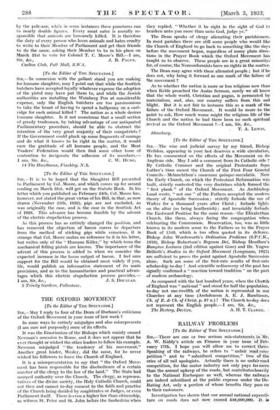[To the Editor of THE SPECTATOR.] SIR,—The wise and judicial
survey by my friend, Bishop Welldon, appearing in your last deserves a wide circulation. He has commented on the effects of the Movement on its Anglican side. May I add a comment from its Catholic side ? By Catholic Cranmer and the original Protestants from Luther's time meant the Church of the First Forie General Councils—Melanchthon's consensus quinque-saecularis. Now the Early Church, on which the Protestant Reformation was built, strictly contestedthe very doctrines which formed the " first plank " of the Oxford Movement. As Archbishop Laud wrote, " not one " of the Fathers accepted the modern theory of Apostolic Succession ; strictly forbade the use of Wafers for a thousand years after Christ ; forbade lights on the altir (as being heathenish) ; and invariably forbade the Eastward Position for the same reason=the Elizabethan Church, like them, always facing the congregation when celebrating the Communion. Reservation, too, was as little known in its modem sense to the Fathers as to the Prayer Book of 1549, which is too often quoted in its defence. Bishop John Wordsworth's Ordination Problems (S.P.C.K., 1910), Bishop Robertson's Regnuns Dei, Bishop Headlarn's Bamplon Lectures (2nd edition against Gore) and Dr. Yngwe Brilioth's Studies in the Orford Movement (Longmans, 1925) are sufficient to prove the point against Apostolic Succession alone. Such are some of the first-rate results of first-rate scholarship to-day ! And scientific rediscovery of the past has signally confirmed a " reaction toward tradition " on the part of modem archaeology.
As compared with the last hundred years, when the Church of England was " national " and stood for half the population, to-day not one-twelfth of the nation is represented in our Churches at any time (Archdeacon A. E. J. Rawlinson, Ch. of E. & Ch. of Christ, p. 87 n.) ! The Church to-day does not represent the English people.—I am, Sir, &c., .


















































 Previous page
Previous page